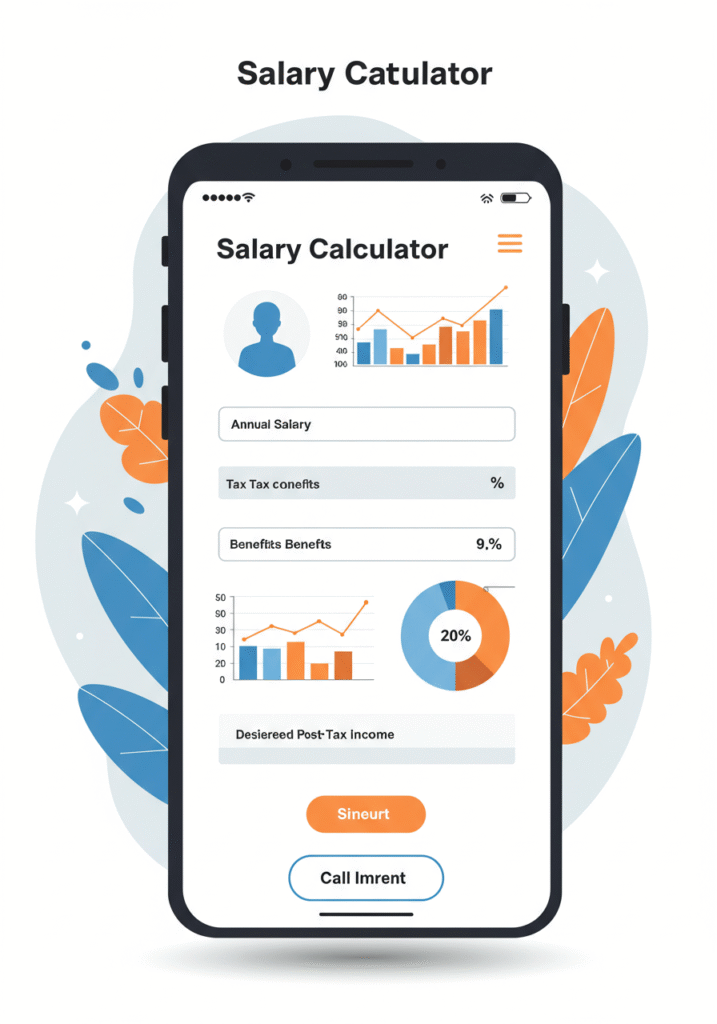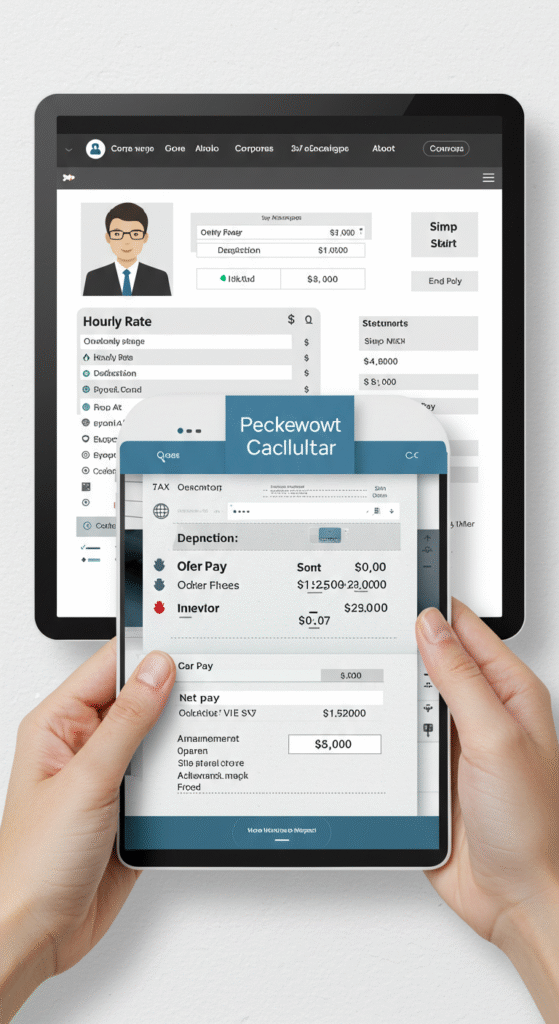Calculate Your Salary Paycheck Expertly!
Free accurate paycheck calculators for all 50 US states. Understand your take-home
pay, taxes, and deductions with our easy-to-use salary calculator.
Why Choose Our Calculators?
Get accurate, up-to-date paycheck calculations with our comprehensive suite of tools designed for every US worker.
State-Specific Calculators
Accurate paycheck calculations for all 50 US states with state-specific tax rates and deductions.
Multiple Pay Frequencies
Calculate for weekly, biweekly, semi-monthly, monthly, and annual pay periods.
Detailed Breakdown
See exactly where your money goes with comprehensive tax and deduction breakdowns.
Always Updated
Tax rates and thresholds updated annually to reflect current IRS and state guidelines.
Free for Everyone
No hidden fees, no registration required. Just accurate, reliable paycheck calculations.
Tax Planning Tools
Plan ahead with insights into your annual tax obligations and take-home pay.
How It Works?
Calculate your paycheck in three simple steps. No registration required; completely free to use.
Choose Your State
Select your state from our comprehensive list of all 50 US states.
Enter Your Information
Input your salary, pay frequency, filing status, and any pre-tax deductions.
03.
Get Your Results
View your detailed paycheck breakdown, including federal, state, and local taxes.
Ready to Calculate Your Paycheck?
Join thousands of Americans who trust our calculators
for accurate paycheck calculations. Start with your state today.
Paycheck Calculator: Calculate Your Take-Home Pay
Did you know that over 70% of employees in the United States don’t fully understand how their paycheck is calculated? With complex federal, state, and local taxes, plus various deductions, it’s easy to feel overwhelmed. That’s where a paycheck calculator becomes invaluable — helping you accurately determine your net income from your gross salary, no matter your pay frequency or state.
Whether you’re paid weekly, biweekly, or monthly, understanding what happens to your earnings between gross pay and take-home pay is essential for budgeting, tax planning, and financial wellness. In this guide, you’ll learn everything about paycheck calculations — from key taxes like FICA (Federal Insurance Contribution Act) to deductions such as health insurance premiums and retirement contributions like 401(k) or Roth IRA. Plus, we’ll show you how our paycheck calculator simplifies this process for employees and employers alike.
What Is a Paycheck Calculator?
A paycheck calculator is an online tool for estimating your net income—the amount you actually receive after all taxes and deductions are taken out from your gross pay. By using a paycheck calculator, employees can better understand how factors like filing status or collective bargaining agreements affect their paycheck. Employers use them to ensure accurate payroll processing in compliance with laws like the Fair Labor Standards Act (FLSA) and regulations from the Internal Revenue Service (IRS). These calculators can account for:
- Federal Income Tax
- State and Local Taxes
- Social Security & Medicare Tax (Including Additional Medicare Tax)
- Filing Status (e.g Single, Married Filing Jointly, Head of Household)
- Pay Frequency Differences Like Weekly, Bi-Weekly, Monthly Pay
- Other Deductions such as Health Insurance, 401(k) Contributions, and Flexible Spending Accounts (FSA)
Key Components of a Paycheck Calculation
Gross Pay
This is your total earnings before any taxes or deductions. For example, if you work 40 hours at $20/hour, your gross pay is $800. If you earn overtime or bonuses, these amounts add to your gross pay, increasing the base amount for tax calculations. Gross Pay includes:
- Hourly Wages or Salaried Pay
- Overtime Pay
- Commissions & Bonuses
- Reimbursements
- Pay Frequency Differences Like Weekly, Bi-Weekly, Monthly Pay
- Other Deductions such as Health Insurance, 401(k) Contributions, and Flexible Spending Accounts (FSA)
Taxes Withheld:
- Federal Income Tax: Based on IRS tax tables and your Form W-4 selections, this is the largest mandatory deduction for most. The amount withheld depends on your income, filing status (single, married filing jointly, etc.), and number of dependents.
- State Income Tax: Varies by state; each state having different rates and rules. Some states, like Florida and Texas, have no state income tax, which affects net pay positively.
- Local Taxes: Some cities or counties impose additional taxes. For example, New York City residents pay local income taxes.
- Social Security Tax: Set by FICA, currently 6.2% withheld from wages up to a wage base limit ($160,200 for 2025).
- Medicare Tax: 1.45% withheld from all wages, with no limit. Higher earners pay an additional Medicare tax of 0.9% on wages above $200,000
- Federal & State Unemployment Tax Act (FUTA & SUTA): It is usually paid by employers but indirectly influences payroll processes.
Pre-tax Deductions
These taxes reduce your taxable income, lowering federal and state income taxes. For example, if you contribute $200 monthly to a 401(k), your taxable income decreases by $2,400 annually, lowering your tax burden and increasing your take-home pay.
Common pre-tax deductions include:
- Health Insurance Premiums
- Contributions to Retirement Plans like 401(K), 403(B), Roth 401(K), and IRAs
- Health Savings Account (HSA) Contributions
- Flexible Spending Accounts (FSA) for Medical Care Expenses
Post-Tax Deductions
These do not reduce taxable income but are still taken from your paycheck, such as:
- Loan Repayments
- Union Dues (from Collective Bargaining Agreements)
- Meal Deductions
What remains after all taxes and deductions is your net income — the actual amount deposited into your bank account. This is the number you should focus on for budgeting your daily expenses.
Common Payroll Terms
- Form W-4: An IRS form employees fill out to indicate their tax withholding preferences. Changing your W-4 affects how much federal tax is withheld.
- Collective Bargaining Agreements: Union-negotiated contracts that may influence pay rates, deductions, and benefits.
- Fair Labor Standards Act (FLSA): Federal law regulating overtime pay and minimum wage. Nonexempt employees must receive overtime pay (usually 1.5x) for hours over 40 per week.
- SUTA & FUTA: State and federal unemployment taxes employers pay to fund unemployment benefits.
- Gross Up Calculator: It is used by employers to determine the gross amount to pay when a net pay is desired, factoring in taxes and deductions.


Using Our Paycheck Calculator
Using our paycheck calculator is simple and takes just a few minutes. After entering the below data, the calculator instantly provides your estimated net pay and breaks down each deduction and tax for full transparency.
- Enter Your Gross Pay: Input your hourly wage or salary, including overtime, bonuses, or commissions if applicable..
- Select Your Pay Frequency: Choose from weekly, biweekly, semi-monthly, or monthly pay. Different frequencies affect how taxes are withheld per paycheck.
- Fill In Tax Information: Provide your filing status (e.g., single, married filing jointly) and number of dependents, which helps calculate your federal tax withholding.
- Add Pre-Tax Deductions: Include health insurance premiums, retirement contributions (401(k), Roth IRA), HSAs, or FSAs.
- Add Post-Tax Deductions: loan repayments, union dues, or any other relevant post-tax deductions.
- Select Your State: Choose your state to factor in state income tax rates and any local taxes.
The Impact of Retirement Plans and Benefits on Your Paycheck
Contributing to retirement plans like a 401(k), 403(b), Roth 401(k), or Roth IRA not only helps secure your financial future but also impacts your paycheck today. Remember, employer matches to your retirement plan contributions do not appear in your paycheck but increase your overall compensation.
- Traditional 401(k): These Contributions reduce your taxable income pre-tax, lowering your federal and sometimes state taxes.
- Roth 401(k): These Contributions are made after tax, but qualified withdrawals are tax-free in retirement.
- HSAs and FSAs: These are pre-tax accounts that help you save on healthcare costs and reduce taxable income.


Pay Frequency and its Effects
Your pay frequency determines how often you receive paychecks and can influence your financial planning. Each frequency affects how taxes are withheld and when you receive benefits or deductions. Our paycheck calculator adjusts accordingly to give you accurate per-paycheck amounts.
- Weekly Pay: It is divided into 52 paychecks per year of smaller amounts per paycheck but more frequent.
- Bi-Weekly Pay: It consists of 26 paychecks per year and is most common schedule in the U.S.
- Semi-Monthly Pay: Shortened into 24 paychecks per year and are paid twice a month on set dates.
- Monthly Pay: It comprises of 12 paychecks per year and is often seen in salaried positions.
State Paycheck Calculators: Calculate Your Net Income by State
Understanding how your paycheck is calculated can vary significantly depending on which state you live in. Each of the 50 states in the United States has its own different tax rates, local tax rules, and sometimes additional payroll requirements that can impact your take-home pay. This is why using a state-specific paycheck calculator is essential for the most accurate results.
Our state-by-state paycheck calculators consider all relevant factors for each location, including:
- State Income Tax Rates — which can range from zero (in states like Florida and Texas) to some of the highest rates in states like California and New York.
- Local taxes and city-specific payroll taxes are applicable in certain areas.
- State-specific deductions and credits that affect your taxable income.
Whether you’re working in a no-income-tax state or a high-tax state, our calculators adapt to your location, pay frequency, and filing status to provide a detailed breakdown of your paycheck. Explore our calculators for your specific state to get an accurate snapshot of your paycheck, adjusted precisely to your local tax laws and deductions.
Using a state-specific paycheck calculator helps you:
- Plan Budget realistically by knowing your actual take-home pay.
- Understand moving between states could affect your net income.
- Compare Your Salaries and tax impacts if you’re considering job offers in different states.
- Stay Compliant with state tax laws and payroll regulations.
- Arkansas Paycheck Calculator

Calculate Paycheck
Paychecks can be confusing, but with the right tools and knowledge, you can take control of your finances. Our paycheck calculator helps you cut through the complexity of federal, state, and local taxes, various deductions, and benefit contributions — giving you a clear, accurate picture of your take-home pay.
Start using our paycheck calculator today to plan your budget better, avoid surprises during tax season, and optimize your financial well-being. Understanding your paycheck is the first step toward smarter money management.
Frequently Asked Questions
Gross pay is your total earnings before any deductions. Net pay is what you take home after taxes and deductions.
Your Form W-4 tells your employer how much federal tax to withhold. Changes to your filing status or allowances impact your tax withholding and net pay.
Yes, our paycheck calculator includes tax rates and rules for all 50 states, including local taxes where applicable.
Pre-tax deductions reduce your taxable income before tax is calculated (like health insurance premiums). Post-tax deductions are taken after taxes (like union dues).
Overtime pay is usually paid at 1.5 times your hourly wage and is taxed as ordinary income. Bonuses are also taxable and will increase your gross pay accordingly.
You should consider all income sources when completing your W-4 and calculating your paycheck to ensure correct tax withholding.